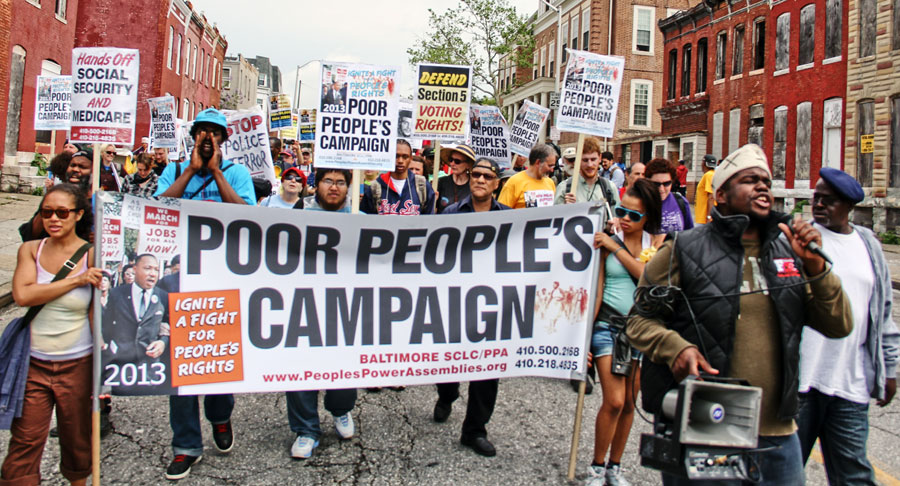

U.S. Route 1, south of Baltimore
Within hours of the start of the Poor People’s Campaign and March, which headed from Baltimore to Washington, D.C., on May 11, words had turned into action. Some hundreds of marchers defied Baltimore County cops who were blocking the way at a Walmart Supercenter in Halethorpe, Md.
Most marchers wove their way past the police and made it to the doors of the mammoth retailer, where they shouted, “Walmart, union! Walmart, union!” and “Walmart, slave wages” as they blocked traffic in the parking lot. The police, who physically abused Black women marchers, made it clear they were there to protect Walmart’s “private property.”
The crowd’s militancy and chants reflected a speech given at the kick-off rally hours earlier when Cindy Murray addressed the crowd from OUR Walmart — an organization of Walmart workers and supporters who are fighting for workers’ rights at the biggest, wealthiest employer in the U.S. She argued for the needs of the low-paid U.S. workforce at Walmart, while emphasizing solidarity with garment workers around the world who are paid next to nothing.
In oppressed countries like Bangladesh, where more than a thousand workers died in April in a factory building collapse, the garment workers, mainly young women, are paid $37 a month for 12-hour days.
The Poor People’s Campaign, which commemorates the 1968 Poor People’s March called by the Rev. Dr. Martin Luther King Jr., is fighting for jobs and union rights for workers. Elliott and another OUR Walmart activist, Barbara Elliott, said the group is planning a march and caravan from May 28 to June 7 to Bentonville, Ark., culminating in an occupation at the site of Walmart’s corporate headquarters. (For more information about the march, see ForRespect.org.)
Kick-off rally sets militant tone
The Rev. C. D. Witherspoon, president of the Baltimore chapter of the Southern Christian Leadership Conference, chaired the kick-off rally, which took place at the very site where the police beat Anthony Anderson Sr. to death. The Anderson family was recognized.
Sharon Black, one of the key Baltimore march organizers, told people from the beginning that “rain or shine, the march would go on to fight for jobs and justice and against police brutality.”
Don Cash was the opening speaker. He is president of the National Minority Coalition of the United Food and Commercial Workers union and national vice chair of the SCLC. Members of Local 400 of the UFCW attended. The march also garnered support from both the Washington, D.C., and Baltimore Central Labor Councils.
With the Poor People’s March focusing attention on police brutality and terror, it was appropriate that the Justice for Alan Blueford group, including Jack Bryson, Mollie Costello and Jeralynn Blueford, made the trip from Oakland, Calif., to Baltimore. Blueford spoke of the police killing of her son, Alan Blueford, a year ago on May 6. Another speaker brought up the case of Joshua Robinson, an African-American youth brutalized in Providence, R.I.
Meches Rosales from the May 1 Coalition in New York City expressed solidarity with the march by making the the connection between the mass incarceration of Black youth with the deportations of Brown people especially immigrants.
A delegation from Selma, Ala., also joined the march. Their spokesperson, Rose Sanders, described an attack on voting rights in their area and explained what it means for the Black community in terms of loss of political representation.
After the rally, despite a wet downpour, hundreds of people started off on foot or in a car caravan for the 41-mile trek to Washington, D.C. The spirited, multinational gathering was about two-thirds African American, with the rest evenly divided between Latino/a and white. They included seniors, children, people with disabilities and many constituencies. By late morning, they arrived at one of the many devastated Baltimore neighborhoods.
The procession of cars and several hundred people marched through the neighborhood chanting, “What do we want? Justice! When do we want it? Now!” and “No justice, no peace!” In the few homes that weren’t boarded up — as so many are in Baltimore City — people leaned out the windows to wave or shout their solidarity with the marchers, as did others on the street.
The march went past a local post office to draw attention to the threat facing hundreds of thousands of postal workers and the neighborhoods they serve. A contingent of postal workers with a sound truck stopped in front of the office to explain the issues. Then the march passed City Hall, which was the site of a mass demonstration last year protesting the death of Trayvon Martin in Florida.
The marchers then headed to College Park, Md., where they were greeted by students from the University of Maryland.
WW photos: Brenda Ryan
En su continua campaña genocida contra el pueblo palestino, Israel utilizó aviones no tripulados el…
Israeli military veteran in Warsaw: ‘Liberate all ghettos’ By Michael Kramer On the 82nd anniversary…
The Vietnamese revolution to liberate its country from imperialism had a decisive victory 50 years…
The epic struggle of the Palestinian people against the full weight of U.S. imperialism and…
The following report comes from the Bronx Anti-War Coalition organizers on a protest held in…
In the Canadian federal elections held on April 28, the Liberals won with 169 seats…